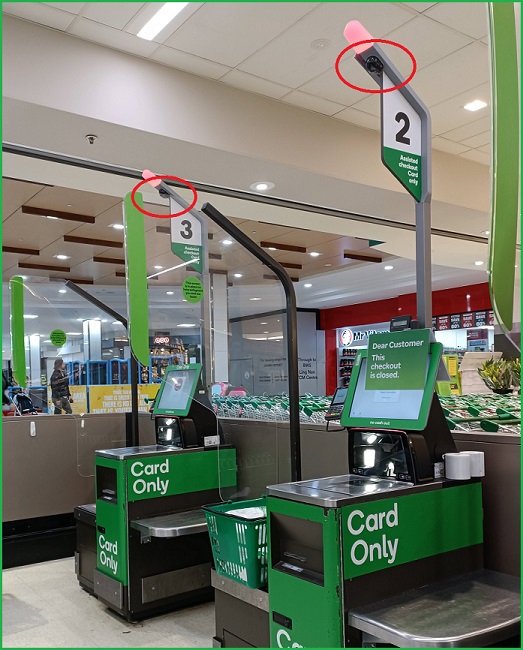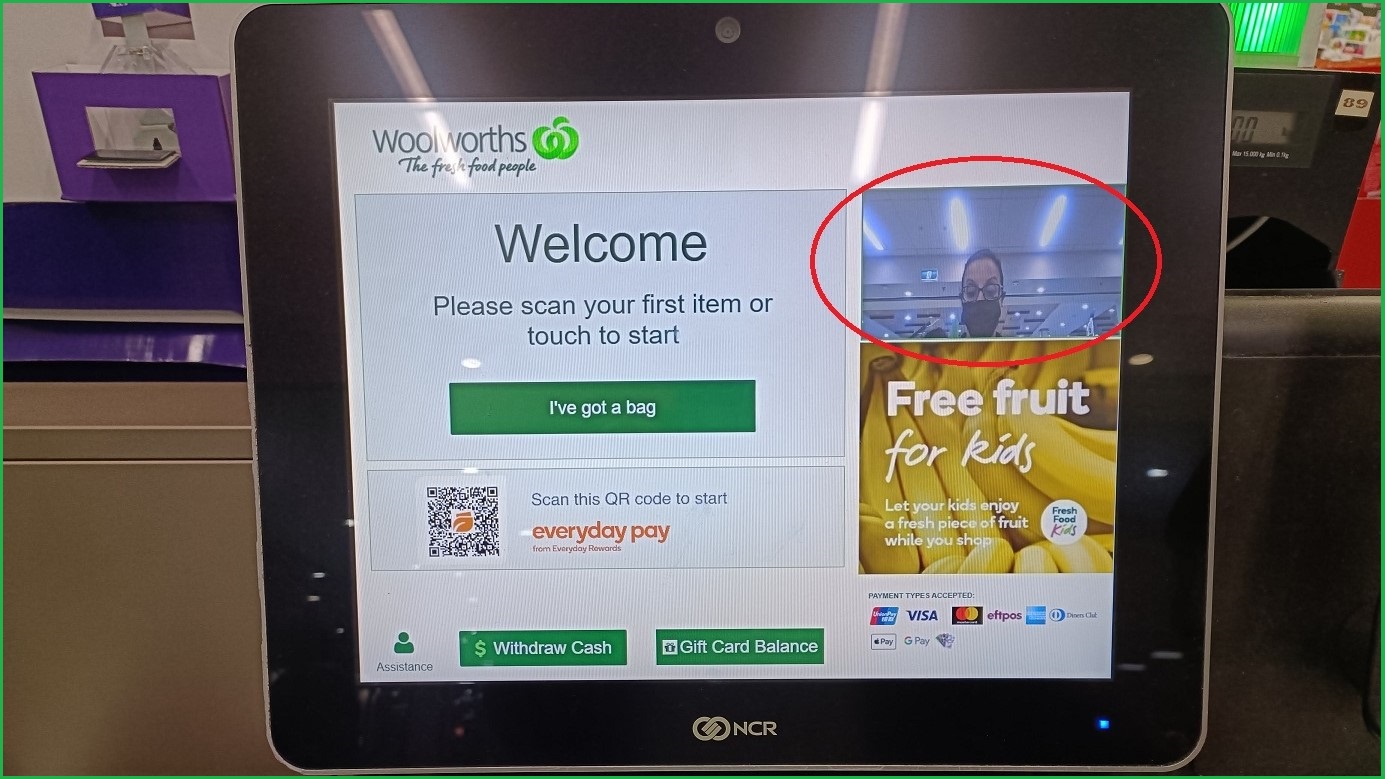More than a year after it began expanding its use of cameras to monitor shoppers at self-service checkouts, Woolworths Group still hasn’t updated its privacy policy to address widespread concerns that recording video of shoppers is an invasion of their privacy.
Woolworths began installing the cameras in 2020, adding cameras that photograph shoppers and display their image onscreen during the transaction.
Last year, it expanded the system to include image-recognition cameras that sense the colour of produce placed on the scale and suggest possible matches.
Earlier this year, Woolworths added overhead cameras that record the customer placing products into shopping bags, producing video footage that allows attendants to verify that customers have rung up the correct products and put them into their bags.

There are also inconspicious cameras above the self check-outs looking down on you. Photo: Roulla Yiacoumi
Woolworths has repeatedly defended the practice as necessary to help stem losses from theft or misrepresentation, and has responded to privacy claims by saying that if the footage is used later, PIN pads are blacked out and customer faces blurred to prevent identification.
For all its claims of caution, however, the company’s official privacy policies have not been updated in more than a year – and neither policy explicitly discusses the recording of customers while they’re using self-service checkouts.
“We collect your personal information to register and manage your account, take your orders and deliver your groceries,” states its Collection Notice regulating online sales, which was last updated in February 2021.
Personal information including name, contact details, date of birth, gender, order, loyalty, and payment details are usually collected from online customers, the policy explains, “directly from you or anyone ordering on your behalf.”
Woolworths also records the location of shoppers using mobile devices where it can.
The Woolworths Group’s umbrella privacy policy – last updated in June 2021 – vaguely addresses video recordings but says only that “cameras (including security, smart and team safety cameras) may record footage and other data which may identify you.”
It also specifies that the company may use customers’ personal information for “fraud detection and security”, including “to verify your identity and to detect fraud activities. We may conduct auditing and monitoring of transactions and financial engagement.”
Personal information is secured by “a range of information security measures”, the policy states, but doesn’t offer information about whether, how long, and how the checkout footage is stored and used.
Despite complaints, however, the chain is said to be expanding its rollout of the cameras, which are installed at 685 of its stores and will shortly be expanded to all of its approximately 1,000 outlets.
Coles has also introduced checkout cameras but is similarly vague about their use, specifying in its privacy policy only that it collects “audio and video footage captured in-store and within facilities”.
Taking workers at face value?
Without clearly referencing its use of checkout cameras, it’s clear many Woolworths shoppers are being caught unawares by the increasing surveillance within its shops.
Such pervasive surveillance – whether with cameras or using purpose-made spyware that tracks employees’ productivity down to the minute while they work – is becoming increasingly common, particularly as employers push back against the freedoms that working from home provides.
Discovering that his former boss had installed a webcam in the corner of the office “made me feel very uncomfortable”, said Matt Marshall, a coffee enthusiast who discovered he was being watched in the office while his previous employer was at home.
One Pollfish-ExpressVPN survey of 4,000 employers and employees, for example, found that just one in three respondents don’t believe employers are actively monitoring their work activities, and 15 per cent didn’t even know it was possible.
Fully 56 per cent of employees said they feel stress and anxiety about being monitored while working, and 48 per cent would accept a pay cut for guarantees they wouldn’t be monitored.
Within this climate, Woolworths’s increasing use of surveillance has struck a nerve for many that see the increasingly powerful capabilities of face recognition and other biometric technologies as threatening expectations of privacy in public places.
They’re also highlighting the importance of clear consent whenever personally identifiable information is being collected – one of many reasons Woolworths’s increased surveillance has been so controversial.
Employers must be particularly careful about the way they use surveillance, no matter how well-intentioned, or risk alienating employees that may not feel comfortable working in a virtual panopticon.
“It’s not just about privacy,” Marshall said.
“It’s also about trust. I trusted him to respect my privacy, but instead he treated me like an object that could be watched at any time.
“I don’t think anyone should have to work under those conditions without knowing about it first.”










